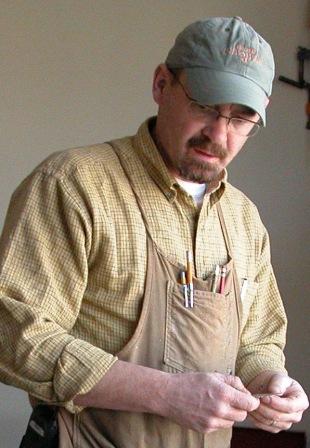"As a perfectionist, you exist only so long as you are tying to make that perfect piece: on second thought, "perfect" is perhaps not quite what I mean, since the very word implies something beyond criticism and also remote from the warmth that keeps our work alive. But I have now and then wanted to do a piece - just one single thing - which would be the sum of all my efforts, and could justify my existence as a craftsman. Of course, that urge serves best while it is an illusion. And what is that perfect piece? You complain because it eludes you--and are secretly glad because you have to complain. You mutter about the a detail or a whole piece being not quite as you wanted...Some mistakes you make and correct...You stand in front of a piece all evening wandering, is it good? Yes, but what about THAT part: is it a mistake? What will happen if you back up and change it? You'll spend time, run the risk of spoiling the whole piece and the result will be - a line: too straight to be quite alive? An edge: if you make it more even will this be a loss, or a noticeable gain? You are not so much worried about the effort or even risk involved, as over something else...." James Krenov - A Cabinetmaker's Notebook
I almost failed the cabinet.
Handles are important. Either they are hidden; unobtrusive - allowing only the piece to exist, or they call out for you to use them. Mostly they do the latter. They beg you to open the hidden; to explore a drawer, open a door. I wanted mine to invite you to look inside and to provide something new on the outside; something unique, something complete.

I envisioned a simple walnut handle, but that was somehow too simple. I wanted it to be a very elongated oval. The shape of the piece suggested something elongated. I plotted how to turn it, how to hold it, how to keep it from spinning out of control. After roughing out the knobs and using a considerable amount of time I was ready for the oval. It was disaster. I couldn't see the knob to turn it. I spun one and quickly destroyed my prior work. My idea of perfection was shattered, my vision marred, and failure seemed like a likely end.
I brooded for days while doing other things. I knew failure could be turned, but that is seldom easy and often fraught with doubt. It is difficult to replace a vision - a concept. A spark finally lit, a new vision started to form and I liked it. I went and got a small piece of ebony and cut up some cardboard in some possible shapes. I liked it. I changed the radius a bit. I cut a wooden template. I liked it. I cut some walnut into 1/4" slices and made the handle. I liked it. My outlook improved, but I still had a long way to go with something I had never done before.
 I needed to mount the handle; to fix it to the doors. Numerous configurations lead me back to the lathe.
I needed to mount the handle; to fix it to the doors. Numerous configurations lead me back to the lathe.I cut up the ebony and readied it for the lathe. I turned it down, pulled it off and decided it was too big. I turned it down some more and was pleased. The other three fell in quick succession.

Often, with cabinet work you spend tremendous amounts of time on something which can then be destroyed so quickly, so thoroughly, that the last steps are almost painful. There is a kind of terror in the air. I had to put a deep, angled mortise down the center of a very small, very hard knob. 1/32" was too much error.
I played with some ideas and arrived at a reasonable solution which would accomplish the task and keep my fingers their original length. My jig worked ok, and a little bench work cleaned up the remainder. I hurriedly finished the remaining work so I could see it finally together. I always get inpatient at this point - wondering if the proportion is right, if the line is good, if it works. I have to mentally slow down; appreciate the ending; not screw up. There's no mistake at this point which wouldn't ruin everything and the pieces were fragile and small.
Once it was finished I was pleased. The handles did invite you to open the doors. The chocolate tones of the wood wooed the walnut and ebony. It was a whole.
Victory comes in small steps. Each piece a part of a whole becomes so intertwined, so dependent on the other, that the victories become indistinguishable. New failures await - the pursuit of perfection presents this foreboding horizon and we plod on to our demise and our ecstasy. It all binds the craftsmen, the cabinetmaker and the artist in its wonderful grip.
I still have my illusion.



No comments:
Post a Comment